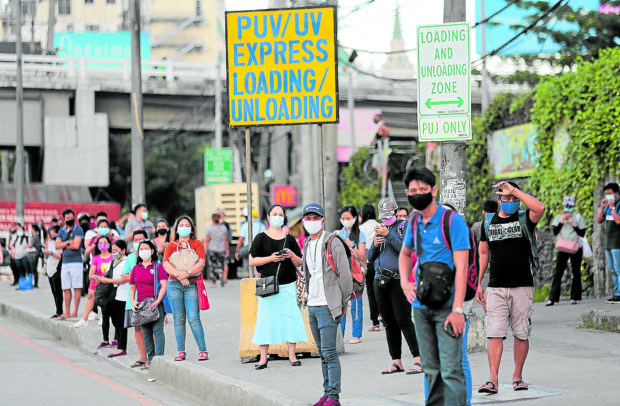
Commuters wait for a ride at a bus stop along Commonwealth Avenue in Tandang Sora, Quezon City on Monday, June 1, 2020, as the metropolis eases to General Community Quarantine (GCQ).
INQUIRER PHOTO / GRIG C. MONTEGRANDE
MANILA, Philippines — The lack of sufficient mass transportation defeated the purpose of slowly opening up the economy since productivity suffered when employees struggled to go to work, a private think tank has said.
The Action for Economic Reform (AER) called out the government on Saturday for its decision to reopen the economy without reopening mass transportation, which left countless workers overcrowding the few available rides or walking for hours to get to work so they would not lose their job.
“To say that this is inhumane is an understatement. It is most insensitive on the part of the IATF [Inter-Agency Task Force] to reopen some parts of the economy without the adequate, safe, and accessible transportation system that workers need,” AER said.
“In the end, the lack of a safe public transport system, arising from the incompetence and insensitivity of the authorities, scuttles the very objectives of gradually opening the economy,” the think tank said.
The lockdown in Metro Manila and other areas had eased under a general community quarantine (GCQ). The first week under GCQ mirrored the first days of the lockdown when the government also banned public transportation but told essential workers to keep working.
The difference, however, is that significantly more workers are now commuting and that more than two months had passed since essential workers, including nurses, had to walk long hours to work because of the lack of transportation.
“Economic activities and productivity suffer as workers struggle to get transportation, and their health are endangered because of their unnecessary exposure to crowding,” AER said.
AER is a public interest organization that conducts policy analysis and advocacy on key economic issues. It was founded in 1996 by a group of progressive scholars as an independent, reform-oriented, and activist policy group, according to its website.
AER also called out Jose Garcia, General Manager of the Metro Manila Development Authority (MMDA), who said commuters are focusing on traveling even though the first priority should be health and safety.
“The MMDA leader seems ignorant that the pandemic has made it a lot difficult for people to even find means to feed their families,” AER said, noting that the agency failed to set up the infrastructure for public transport.
AER said both the MMDA and the Inter-Agency Task Force (IATF) for the Management of Emerging Infectious Diseases should immediately allow mass transportation “that conforms to the highest health and safety standard to operate.”
To comply with safety precautions, the industry needs the government’s help. Social distancing in mass transportation means public utility vehicles could not operate at full capacity, and they should not have to just to make ends meet.
AER said the government should contract jeepneys and buses so that the drivers and operators that comply with health standards could be financially supported.
It said there should also be safe bike lanes; that routes and schedules should be rationalized; and the introduction of a cashless mode of payment.
“These changes in fact serve the longer-term agenda of having a consolidated public transportation system. In this system, cut-throat competition is eliminated, transport workers receive wages and benefits and do not have to work long hours, and commuters get good service through efficient and safe rides,” AER said.

